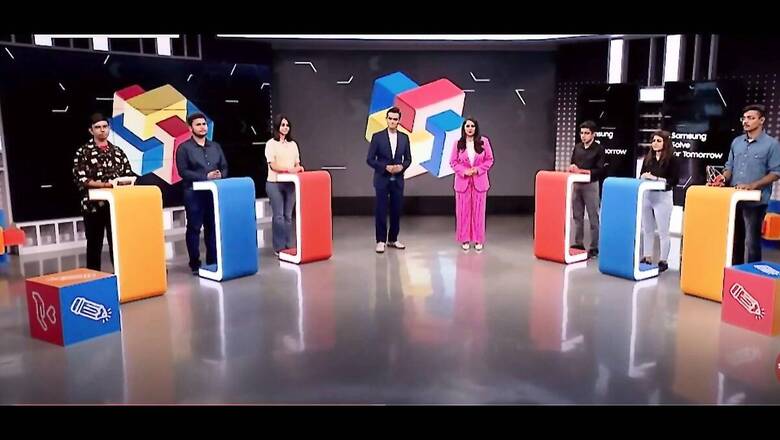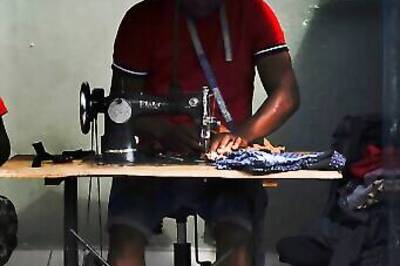
views
Human beings are the only creatures on earth who have the ability to learn from our past, and project into the future. Our ability to learn from our past is what gives us the ability to create and build on the successes of those who came before us – that’s the root of all technology, and all progress: from agriculture to artificial intelligence.
However, none of these accomplishments would’ve come about, if we had lacked the ability to share ideas. Arguably, the first real technological breakthrough for human beings then, was language. For those of us who are privileged to be able bodied, we take our ability to communicate for granted. But as anyone who travels will tell you – all it takes is a bad internet connection in a non-English speaking country, for us to realise how problematic not being able to communicate is.
It’s daunting to realise that for many people in our country, that’s what everyday interactions feel like. For people who are hearing disabled, or for those with speech problems, being able to communicate with the able bodied is a trying experience they don’t have an option to get away from. What compounds this problem in India is that very, very few people know how to communicate in sign language – usually, they happen to have someone differently abled in their own families.
This is the problem that two teams set out to solve, in this year’s Solve for Tomorrow competition by Samsung India. Team Hackvengers are working on a way for the differently abled to ‘talk’ to the rest of us, while Team Musketeers are working on a system that lets the differently abled understand us more easily. In Solve for Tomorrow’s second episode, these two teams had the opportunity to present their prototypes, suss out the competition, and even learn from each other.
For Team Hackvengers, the problem came to the fore when one of the team members, Amit Gohel, witnessed a frustrating interaction when a differently abled girl tried to communicate using sign language, but wasn’t understood and had to walk away, disappointed. For him and the team, the problem was clear – not enough of us learn how to sign… but what if sign language could be translated into voice?
Their solution is both elegant and simple – a wearable device called a ‘Voicer’ captures sign language hand movements, and then converts them into voice. This allows the wearer to communicate with people who don’t know sign language. The team’s strength lies in quick innovation: their first design was a glove, but they soon realised that in our climate, it becomes too sweaty to be comfortable. Now the design involves rings, and the team is working on the design side to make the device less unwieldy and more attractive to wear!
Team Musketeers’ Pratyaksh first came across the problem when he visited a school for the hearing impaired. He could see, firsthand, how the hearing impaired community ends up being disadvantaged because of their inability to effectively communicate with the rest of us. He and the team set out to erase this disadvantage by creating a wearable headset that converts spoken language into text, in 25 Indian languages and another 10 global languages.
The team is working on an app that converts voice into text and sign language in real time, and the AR head that’s not only comfortable to use, but is also inexpensive. The team is committed to bringing these costs down, as they know their audience well – they are already working with NGOs and medical units, and already have a business plan in place.
Ashima Jain from Samsung’s Next Gen AI products team at SRI mentored Hackvengers and is very proud of the progress they’ve made. She did have one final piece of advice for them. “Remember that the user is always right, and you are not your user. The problem they’re solving is unique to a very special community. So, I think they should step into their shoes, understand their day-to-day challenges, and genuinely address those problems at the ground level. Feeling the customer’s pain is the very first step.”
Lahar Gupta from Samsung’s Cloud and Natural Language Processing team at SRI is the mentor for Team Musketeers. She too, is very positive about the team’s prospects, and had a final word of advice for her teamthem, “I would suggest that they prioritise quality while considering the target audience, which is physically disabled people who might have cost constraints. The product should be reasonably priced to make it accessible to a broader audience.”
In case you haven’t been following the Solve for Tomorrow competition, Team Hackvengers and Team Musketeers are in the Top 10, and hurtling towards the finale where the Top 3 teams will compete to win the a total prize money of Rs 1.5 crores towards bringing their projects to fruition.
You can watch the full episode here, and keep an eye on the teams’ progress as they take on the biggest challenges yet, at Solve for Tomorrow by Samsung India.




















Comments
0 comment